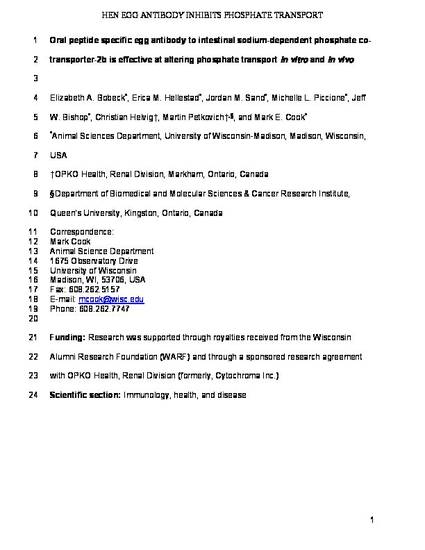
Article
Oral peptide specific egg antibody to intestinal sodium-dependent phosphate co-transporter-2b is effective at altering phosphate transport in vitro and in vivo
Poultry Science
(2015)
Abstract
Hyperimmunized hens are an effective means of generating large quantities of antigen specific egg antibodies that have use as oral supplements. In this study, we attempted to create a peptide specific antibody that produced outcomes similar to those of the human pharmaceutical, sevelamer HCl, used in the treatment of hyperphosphatemia (a sequela of chronic renal disease). Egg antibodies were generated against 8 different human (h) intestinal sodium-dependent phosphate co-transporter 2b (NaPi2b) peptides, and hNaPi2b peptide egg antibodies were screened for their ability to inhibit phosphate transport in human intestinal Caco-2 cell line. Antibody produced against human peptide sequence TSPSLCWT (anti-h16) was specific for its peptide sequence, and significantly reduced phosphate transport in human Caco-2 cells to 25.3 ± 11.5% of control non-specific antibody, when compared to nicotinamide, a known inhibitor of phosphate transport (P ≤ 0.05).
Antibody was hen produced against the mouse-specific peptide h16 counterpart (anti-m16) for further analysis in a murine model. When anti-m16 (mouse sequence TSPSYCWT) was fed to mice (1% of diet as dried egg yolk powder), egg IgY was detected using immunohistochemical staining in mouse ileum, and egg anti-m16 IgY co-localized with a commercial goat anti-NaPi2b antibody. The effectiveness of anti-m16 egg antibody in reducing serum phosphate, when compared to sevelamer HCl, was determined in a mouse feeding study. Serum phosphate was reduced 18% (P < 0.02) in mice fed anti-m16 (1% as dried egg yolk powder) and 30%
(P < 0.0001) in mice fed sevelamer HCl (1% of diet) when compared to mice fed nonspecific egg immunoglobulin. The methods described and the findings reported show that oral egg antibodies useful and easy to prepare reagents for the study and possible treatment of select diseases.
Keywords
- hen egg antibody,
- IgY,
- NaPi2b,
- phosphate transport,
- sevelamer
Disciplines
Publication Date
June, 2015
DOI
10.3382/ps/pev085
Publisher Statement
Copyright 2015 Poultry Science Association Inc.
Citation Information
Elizabeth A. Bobeck, Erica M. Hellestad, Jordan M. Sand, Michelle L. Piccione, et al.. "Oral peptide specific egg antibody to intestinal sodium-dependent phosphate co-transporter-2b is effective at altering phosphate transport in vitro and in vivo" Poultry Science Vol. 94 Iss. 6 (2015) p. 1128 - 1137 Available at: http://works.bepress.com/elizabeth-bobeck/13/
